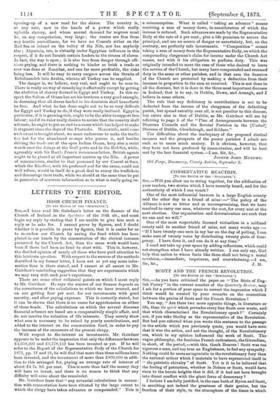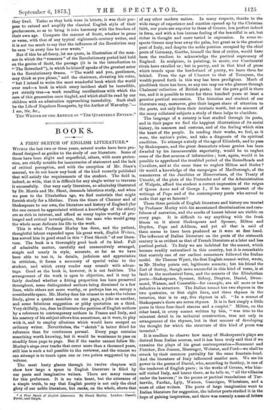SCOTT AND THE FRENCH REVOLUTION.
[TO THE EDITOR OF THE "SPECTATOR."]
SIR,—As you have criticised the paper on "The State of Eng- lish Poetry" in the current number of the Quarterly Review, may I ask for a portion of your space to correct the impression which I think would be created by your remarks on the connection between the genius of Scott and the French Revolution ?
You say, " Are there two more opposite things, in literature or- life, than the spirit which pervades every line Scott ever wrote, awl that which characterised the Revolutionary epoch ?" Certainly not, if you take Shelley as the representative of the Revolution_ But had you referred when you wrote this sentence to the passage in the article which you previously quote, you would have seen• that it was the action, and not the thought, of the Revolutionary era, which in my opinion influenced the work of Scott. The- vague philosophy, the feminine French enthusiasm, the Girondismy in short, of the period,—with this, thank Heaven I Scott was too vigorous a man, and too true an Englishman, to feel any sympathy.. Nothing could be more antagonistic to the revolutionary fury than the national ardour which I maintain to have represented itself in " the patriotic chivalry" of Scott. Yet is it to be believed that the feeling of patriotism, whether in Nelson or Scott, would have risen to the heroic heights that it did, if it had not been brought into direct conflict with the giant force of democracy ?
I believe I am fully justified, in the case both of Byron and Scott, in ascribing not indeed the greatness of their genius, but the freedom of their style, to the atmosphere of the times in which they lived. Tories as they both were in letters, it was their pur- pose to extend and amplify the classical English style of their predecessors, so as to bring it into harmony with the freedom of their own age. Compare the manner of Scott, whether in prose or verse, with that of any typical eighteenth-century writer, and it is not too much to say that the influence of the Revolution may be seen "in every line he ever wrote." But if this be all fancy, let me quote, in illustration of the man- ner in which the " romance " of the Revolutionary period laid hold on the genius of Scott, the passage (it is in the introduction to " The Betrothed "), in which be himself speaks of the greatest actor in the Revolutionary drama. " The world and you, gentlemen, may think as you please," said the chairman, elevating his voice, "but I intend to write the most wonderful book which the world ever read—a book in which every incident shall be incredible, yet strictly true—a work recalling recollections with which the ears of this generation once tingled, and which shall be read by our children with an admiration approaching incredulity. Such shall be the Life of Napoleon Bonaparte, by the Author of Waverley."— I am, Sir, &c.,
THE WRITER OF THE ARTICLE IN "THE QUARTERLY REVIEW."































 Previous page
Previous page